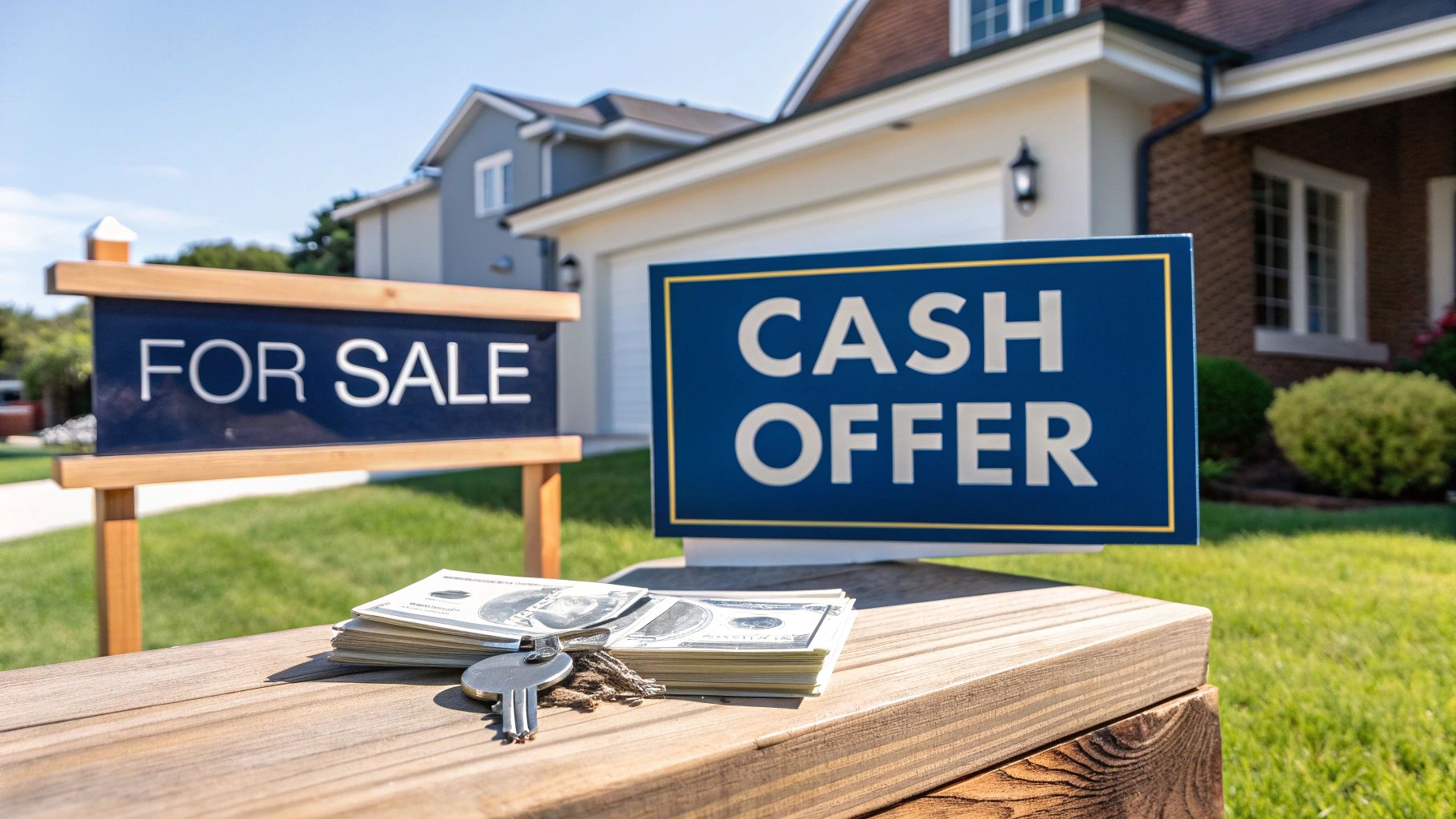If you need to sell your house fast, exploring a cash sale is often the most direct route.The process of selling through a cash buyer lets you receive an offer within 24 hours and enables you to finish the entire transaction between 7 and 14 days.The platform functions at a rate which exceeds the conventional market listing procedure by a large margin.
Your Guide to a Fast Cash Home Sale
Life delivers random obstacles which nobody can predict. The problem develops when someone needs to handle both new work assignments and their inherited property responsibilities and their current home maintenance duties. When time is of the essence, waiting for the perfect buyer to materialize on the open market just isn’t an option.
A fast cash sale becomes necessary in this situation.The platform provides an instant answer which bypasses the long waiting times of conventional real estate transactions. Our objective is to present you with a straightforward evaluation of your choices so you can select the best option for your circumstances without unnecessary anxiety.
Why Speed Is a Game-Changer in Real Estate
The conventional procedure for selling a house requires an extended duration which surpasses typical timeframes. The industry standard indicates that the average period between listing and closing takes about 99 days. The property stayed on the market for 58 days before the buyer’s loan processing period took 41 days according to Homelight data.
Cash buyers make their purchases directly which avoids all the complex legal procedures. The lack of lenders in this process allows you to avoid the lengthy appraisal and financing approval process which often causes delays in traditional home sales.
The accelerated timeline delivers multiple essential benefits to the process:
- Real Certainty: Cash offers are solid.The transaction process does not experience any last-minute interruptions because banks refuse to approve mortgages for buyers.
- Unmatched Convenience: Most cash buyers purchase properties “as-is.”The sale enables you to avoid spending time and money on home repairs and cleaning and staging for particular buyers.
- Pure Simplicity: The whole process is stripped down.The process requires less documentation and fewer participants while eliminating the requirement to adjust your schedule for public open houses.
Consider a cash sale as a planned business decision. The chance to obtain top market value would require you to accept immediate payment and guaranteed convenience. The option to sell right away brings immediate relief to many sellers while providing them with guaranteed peace of mind.
Traditional Sale vs. Fast Cash Sale At a Glance
The two options become more apparent when you compare them directly.The selling process through an agent provides benefits yet cash sales show their advantage when speed and convenience become your primary concerns.
| Factor | Traditional Market Sale | Fast Cash Sale |
|---|---|---|
| Timeline | 2-3+ months | 7-21 days |
| Repairs | Often required to attract buyers | Not necessary (sold “as-is”) |
| Showings | Multiple public showings and open houses | One quick walkthrough |
| Financing | Buyer’s loan can be denied | No financing contingency; deal is secure |
| Commissions | Typically 5-6% of the sale price | Zero agent commissions |
| Closing Costs | Seller often pays a portion | Buyer usually covers all costs |
| Certainty | Deal can fall through at multiple stages | High degree of certainty from the start |
The correct way exists based on what you want to accomplish.The table demonstrates you have multiple alternatives to the standard method of home selling.
The first step to learning this process requires you to discover a person who will back you up. The information about home buying companies will enable you to decide between local investors and national firms when selling your home. A company with straightforward processes accelerates the closing process while reducing stress levels.
Understanding Your Options for a Quick Cash Sale
The process of selling your house for cash does not have any established path which you must follow.The right decision depends on your property status and your exact location and how quickly you require funds in your bank account.
The first actual step you need to take requires you to learn about the fundamental participants in the cash-buying market.Each choice presents various compromises between speed and convenience and the final amount you will receive. The main routes need to be analyzed so you can determine which one suits your requirements.
Exploring iBuyers for Modern Homes
Large technology-based companies known as iBuyers use algorithms to generate fast cash offers for homes.They’re the “instant buyers” of the real estate world.The best choice for this option applies to homes that maintain their original condition and have been built within the last few years while situated in urban metropolitan areas.
Think of it as a mostly hands-off, digital process:
- The process begins when you enter your property information on their website.Your first offer will arrive within 24 to 48 hours based on current market data.
- If you accept, they’ll schedule an assessment (either virtual or in-person) to confirm the home’s condition.
- Afterward, you get a final, adjusted offer.The estimate includes repair costs and service fees which match the standard commission rates that real estate agents receive.
iBuyers operate at high speed with fixed timeframes but they accept only certain types of properties.They almost never buy homes that need a ton of work.
Working with Local Cash Buyers and Investors
Local cash buyers and investors operate under an entirely different business structure. These buyers function as small enterprises which include local businesses and private buyers who purchase properties in their current state. This makes them a fantastic option if your house has seen better days, is outdated, or if you’re navigating a tricky situation like an inherited home.
The buyers possess the ability to detect future value in properties although they see only the current surface-level flaws.The investors use home value After Repair Value (ARV) to base their offers by subtracting renovation expenses and their desired profit margin. The formula enables them to execute fast property deals which iBuyers tend to avoid and that could stay on the market for long periods in traditional listings.
The human factor together with adaptability stands as the most important benefit in this situation.A local investor understands regional market details better than others so they could provide relocation assistance and flexible closing dates which fit your schedule.
Attracting Cash Offers on the Traditional Market
The traditional market requires you to stay active in your search.A home owner can sell their property through an agent while still having the possibility to receive a cash offer. All-cash offers lead the market because they remove the risk of buyers losing financing approval.
A smart pricing strategy acts as the primary method to attract these buyers.Offering your property at a price slightly under market value will attract investors and other cash buyers who want to find a good bargain.Knowing fair market value helps you spot the right offer even when you need to act fast.
The process needs extra effort because it involves open houses and showings and multiple negotiation rounds yet it sometimes produces better prices than cash offers. The trade-off, of course, is that there’s no guarantee of a quick sale.
The proper direction becomes clear when you examine the advantages of cash home sales against what matters most to you.Homeowners who need quick closings with guaranteed certainty should select cash sales through direct transactions with trustworthy buyers. Eagle Cash Buyers exist in the market to help you because they present a clear buying system which offers you a fair price and lets you choose when to close the deal.
Getting Your Home Ready for a Cash Buyer
So, you’re selling to a cash buyer.The process of selling a home through traditional means requires sellers to complete major repairs and costly renovations yet cash buyers allow you to avoid these expenses. You need to avoid becoming inactive but you must not do absolutely nothing.
Small preparation efforts create major differences in results.The goal is to present the house in a way that helps buyers envision their future life there.Think of it from their shoes.The buyers purchase properties in their existing condition but they require complete visibility of the structural and layout elements to determine their maximum offer amount.Your goal is to help them do that.
Focus on Clarity and Access
The most important thing you can do?Declutter.The process of removing excess boxes and furniture and personal items enables investors to understand their actual available workspace. Users can access property floor plans and structural information through the app without experiencing any service interruptions.
The process of home decluttering remains essential because businesses will buy your property regardless of its current condition. The cleaning process enables you to prepare your space for upcoming activities while making your relocation process easier. A clean and organized home space indicates proper maintenance which will strengthen your case.
A common mistake I see is sellers thinking “as-is” means they can leave the house jam-packed with stuff.If an investor can’t easily get to the furnace, inspect the foundation walls, or even see the back of a closet, they have to assume the worst.The uncertainty factor usually becomes part of their offer price and it works against you.
Gather Your Paperwork
Want to speed things up?Get your documents in order before you even list the property.The closing process can be made faster through this particular method.Your readiness to sell shows you are ready to do business because you have all the necessary information.
Try to pull these items together ahead of time:
- Property Deed: The official document proving you’re the legal owner.
- Recent Utility Bills: These give the buyer a snapshot of monthly running costs.
- Property Tax Statement: Shows the current tax assessment and if you’re up to date.
- Warranty Information: Got a transferable warranty for the roof, HVAC, or major appliances? Have it ready.
By sharing everything with the buyer you build trust which results in an easy due diligence process.The process enables buyers to make quick decisions which results in fast transactions that match your desired outcome.
You should select a professional cash buyer when you need fast service and desire to work with knowledgeable experts.Eagle Cash Buyers provides a free offer to sell your property quickly through their services.
How to Find and Vet Reputable Cash Buyers
Cash home purchasing functions through a complex network of various components.The industry comprises two types of flippers: local independent operators who conduct business from their trucks and national companies that run professional websites. Your role requires you to remove all interruptions so you can discover a trustworthy partner.
A good buyer will show total honesty and professional conduct while avoiding any attempts to rush you into a deal before you are ready. The process starts with defining what to search for at the beginning.Research beforehand allows you to avoid major problems while getting the best possible price.
Building Your Due Diligence Checklist
The system functions as your personal verification process.A reputable buyer will actually appreciate your thoroughness—it shows you’re a serious seller.
First things first, check for basic business legitimacy.The website needs to show a professional design.The Better Business Bureau and Google provide review information about this company.If anyone tries to rush you into a deal or demands payment upfront or provides contracts that you cannot comprehend then you should be suspicious.
Key takeaway: A legitimate cash sale is always finalized through a neutral, third-party professional, like a licensed title company or real estate attorney.The process protects all parties who participate in the transaction.
What if My House Needs a Ton of Work? Can I Still Sell for Cash?
Yes, absolutely.Most people choose the cash sale method because of this main reason.Professional home buyers along with investors demonstrate their worth by purchasing homes no matter what condition the property exists in.
The condition of your home does not affect the process whether you have a deteriorating foundation or a roof that needs replacement or a kitchen stuck in the 1970s.These buyers possess the necessary teams and resources to handle large-scale projects.The property sale method allows you to avoid all renovation expenses and challenges. Just be upfront about any known issues, and the whole process will go much smoother.
You have numerous options but a reliable partner will deliver the most significant value.Eagle Cash Buyers operates through a straightforward buying process which uses no pressure tactics. The company will provide you with a cash offer and let you choose the closing date that suits your schedule.
If you require a simple fast sale then visit Eagle Cash Buyers to discover their complete process.





